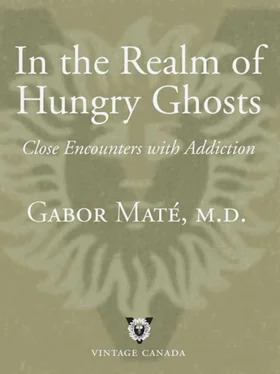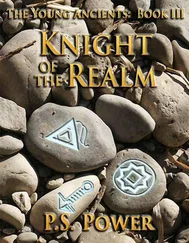Howard tells his story during a methadone visit, the first since his recent brief hospitalization for a knee fracture and another weekend in prison for having missed a parole appointment. He wipes away tears as he mentions his grandmother and then says, “Enough,” with an abrupt shift of tone from despondence to determination. “I have to give something back. I need to get off drugs. I didn’t go through all that for no purpose. I could be dead in a year and nobody would know I was ever here. I must give something back. I learned a lot in jail, and if I can keep just one child from going down the same road…”
“You need help yourself first,” I suggest.
“Yeah, I’ll go for that now. My head always told me that I have to figure it out all myself. I can’t.”
Whether we see this man’s history as defeat or triumph is a matter of perspective. He has risen through depths of despair most of the society that ostracizes him cannot begin to fathom, and there is still spirit in him that wants to contribute, to create meaning and to affirm life. I don’t know if his future will see that spirit manifested in action, but its very existence is a miracle.
Later that morning little wizened Penny scampers into my office, followed by her hefty friend Beverly. Since the death of Penny’s common-law husband, Brian, she and Beverly have been inseparable. I often see them together on Hastings: Penny shuffles her feet rapidly in small steps, her hunched back bent over her walker, and Bev ambles with heavy gait at her side. Today, as an unseasonable November snowfall drifts down from a leaden sky and blankets the street below, the two women can scarcely contain their excitement and their eagerness to share some glad tidings.

Brian’s terminal liver cancer from hepatitis C was confirmed in the early summer of 2005, on the same day that I admitted Penny to St. Paul’s Hospital with a spinal infection that would keep her on intravenous antibiotics for six months. It’s a day I won’t forget. The two of them lay in emergency a few beds apart. As I spoke with Brian, Penny’s pain-driven, demented shrieking could be heard throughout the ward.
“I’ve had my CAT scan,” Brian said. “You were right, they told me I have a few months to live. They’re sending me to palliative care. When can I leave hospital?”
Beneath his sweat-beaded forehead matted with damp and tousled red hair, Brian’s sunken eyes shone out from his gaunt, bearded face. He was emaciated from his silent battle with cancer. Not until his swollen liver bloated his belly and made it hard as a drum did he complain to me of pain. He asked, so I had to tell him that even “a few months” seemed overly optimistic to me.
“You want to be discharged as soon as your pain is under control?”
“Yeah, got things to do. Want to reconnect with my family.”
“Where are they?”
“All over. I’ve got six kids—four living, two dead…I never told you about them? One died in a car accident; one got murdered. The fucker shot him over a lousy fifteen hundred dollars. I would’ve given him the money.”
“Was it over drugs?”
“Yeah, that’s what he was into. Wanted to be like the old man, I guess. I was in jail at the time. He was twenty-one.”
“So the others, do you have any idea where they are?”
“Yeah, they shouldn’t be that hard to find. Haven’t spoken to any of them for twenty years, though…Penny, how is she, Doc?”
“I just saw her. As you can hear, she is in a lot of pain.”
“She’s going to make it, though?”
“She’ll make it. The abscess in her spine could be affecting her brain now, but she’ll make it. I’ll look after her…Brian, are you as calm as you appear to be or are you pretending?”
“It’s just another step, Doc. I came close a couple of times before. I’ve been shot at and stabbed and OD’d. I don’t know…I’m not looking forward to it, I’ll tell you that much. But I’m not afraid of it. If there’s something there, there’s something there. If there isn’t, there isn’t. We won’t know till we get there. I prefer to believe there is.”
A few weeks later Brian became the first of three patients in my practice to die of liver cancer within a period of four months. In his early fifties, he was the oldest. Stevie was the second; in her final days she used the subcutaneous infusion line inserted by the home nurses for pain relief purposes to inject herself with heroin. “I might as well go out singing,” she said. I was okay with that—heroin is as good an analgesic as morphine. So Stevie went, skin and eyeballs bright yellow, shooting and smiling to the end. Several times a day she pulled the string on the mechanical, musical bear on her bedside table and watched him cavort, wiggling his head, arms and butt to “Hey! Macarena.”
On my rounds through the Downtown Eastside hotels I’ve seen that many of the women have large, soft teddy bears to hug. One sex trade worker keeps a collection of several hundred, stuffed in every corner of her tiny, dark room. The largest one is the size of a child. Stevie, with her characteristic exuberance, owned the only dancing bear.
Quiet, reclusive Cory was the third with hepatic cancer to go, just a few days after Stevie. “I’ve been partying too much and it’s caught up with me,” he said laconically on learning of his terminal illness. The time between Cory’s diagnosis and death was little more than a week. He asked me to be present as he called his sister in Ireland to tell her he wouldn’t be flying home to die. We used the speaker phone in my office. The sister spoke her questions with a musical, soft Irish lilt, answered by Cory’s hoarse whisper.
“How you doin’, baby. How are you, love. Are you okay, pet?”
“Bad news, Shany, bad news.”
“Bad news, Cory. So when are you comin’ home, pet? Tell the truth now.”
“I’m not comin’ home, Shany. Too much pain. I just decided yesterday. It’s too painful. But I got good help here.”
“Are you strong in yourself?”
“I’m okay that way.”
“Cory, I want to come and hug and kiss you, pet. I want a hug.”
“Yeah, me too, baby.”
“I’ll try to come very, very soon. We love you very, very much, Cory. And we’re praying for you, Cory. I’ll try to remember all the great times and how much you enjoyed your life. We have to remember all the good things. “
“Yeah, and I can get buried over there. You can bring me over there to get buried.”
“Oh, yes, we’ll bring you over here to bury you. We will, indeed, Cory. We will indeed, we’ll bring you home, love. We really will bring you home, don’t you be worried about that.”
“No.”
“I’ll play good music for you, Cory. The best for you, Cory. We have great musicians and singers here in Derry.”
“Yeah, play ‘A Whiter Shade of Pale.’”
“What’s that?”
I had intervened in the conversation only occasionally to clarify one clinical point or another. Now Cory, fatigued, motions me to the phone. “He would like you to play ‘A Whiter Shade of Pale,’” I say.
“‘A Whiter Shade of Pale.’ I will do that for him.”
“By Procol Harum,” Cory croaks.
“I’ll get that for you, Cory, and we have some lovely Irish music with some lovely instruments and we have all the great singers here during Mass on a Sunday in our cathedral, and I will bring them all down for you.”
By now Cory was too uncomfortable to continue, either due to physical pain or emotional tension. He said his goodbyes to his sister and left the room. Shany and I went through the medical history and the dire prognosis. At that time she was still hoping to visit her brother.
Читать дальше













